Search
Latest topics
» Cooked worms?by markqz Today at 19:38
» What are you eating from your garden today?
by cyclonegardener Yesterday at 19:35
» N & C Midwest: Nov. Dec. 2024
by OhioGardener Yesterday at 14:06
» Tree roots, yeeessss.....
by KiwiSFGnewbie 2024-11-16, 21:17
» New SFG gardener in Auckland
by KiwiSFGnewbie 2024-11-16, 20:25
» Kiwi's SFG Adventure
by KiwiSFGnewbie 2024-11-12, 16:10
» Thanksgiving Cactus
by OhioGardener 2024-11-12, 14:40
» Happy Birthday!!
by sanderson 2024-11-11, 08:57
» Need Garden Layout Feedback
by markqz 2024-11-09, 18:16
» Thai Basil
by Scorpio Rising 2024-11-08, 17:52
» How best to keep a fallow SFG bed
by KiwiSFGnewbie 2024-11-08, 17:11
» Preserving A Bumper Tomato Harvest with Freezing vs Canning
by plantoid 2024-11-07, 08:36
» Mark's first SFG
by sanderson 2024-11-06, 20:51
» What Have You Picked From Your Garden Today
by OhioGardener 2024-11-05, 11:29
» Greetings from Southeastern Wisconsin
by sanderson 2024-11-05, 11:01
» Spinning Compost Bin-need some ideas
by rtfm 2024-11-02, 16:49
» Growing fruit trees in Auckland
by OhioGardener 2024-10-31, 13:23
» Vermiculite -- shipping sale through 10/31/2024
by markqz 2024-10-30, 11:27
» N & C Midwest: October 2024
by Scorpio Rising 2024-10-30, 07:38
» Old Mulch and Closing Beds for Winter
by sanderson 2024-10-26, 20:00
» Ohio Gardener's Greenhouse
by OhioGardener 2024-10-25, 16:17
» Hello from Land of Umpqua, Oregon Zone 8b
by sanderson 2024-10-25, 12:14
» Hello everyone!
by SFGHQSTAFF 2024-10-24, 12:22
» Senior Gardeners
by sanderson 2024-10-23, 15:09
» Hello from South Florida
by markqz 2024-10-23, 07:30
» Confirm what this is
by sanderson 2024-10-11, 11:51
» Harlequin Beetles?
by sanderson 2024-10-07, 12:08
» N & C Midwest: September 2024
by OhioGardener 2024-09-30, 13:13
» The SFG Journey-Biowash
by OhioGardener 2024-09-29, 05:33
» Fall is For Garlic Planting
by Scorpio Rising 2024-09-27, 21:19
Google
Biochar?
+21
ronbart
Dan in Ct
plantoid
OhioGardener
Kelejan
AtlantaMarie
No_Such_Reality
sanderson
SQWIB
BeetlesPerSqFt
countrynaturals
southern gardener
Yardslave
Pollinator
Turan
Marc Iverson
floyd1440
jimmy cee
camprn
landarch
sfg4uKim
25 posters
Page 3 of 5
Page 3 of 5 •  1, 2, 3, 4, 5
1, 2, 3, 4, 5 
 Re: Biochar?
Re: Biochar?
Just an update on the Bio-Char. Is it helping? Yes, I can't say for sure how it is helping but I can say for sure that it has increased the Soil Friability dramatically and earthworms are rampant throughout the beds so its not adversely affecting the earthworms, (based on observation, no control is set up)
I'll be grinding some to a powder (best I can) and mixing with coffee grounds 50/50 to add to the beds in the late winter.
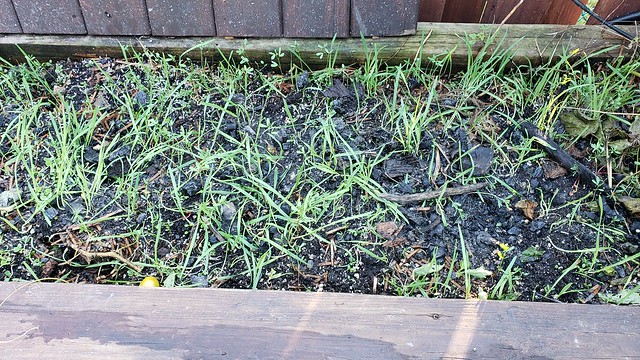
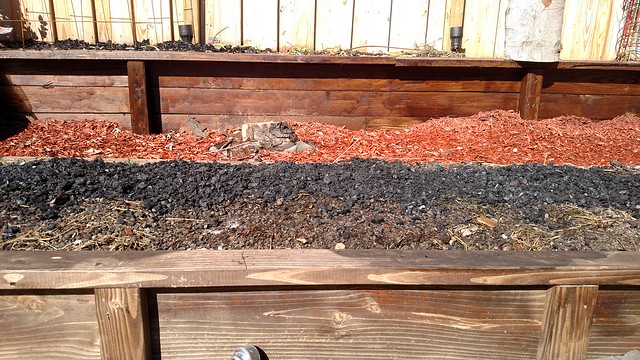
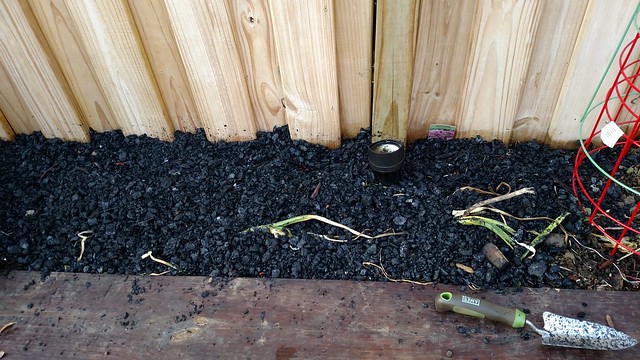
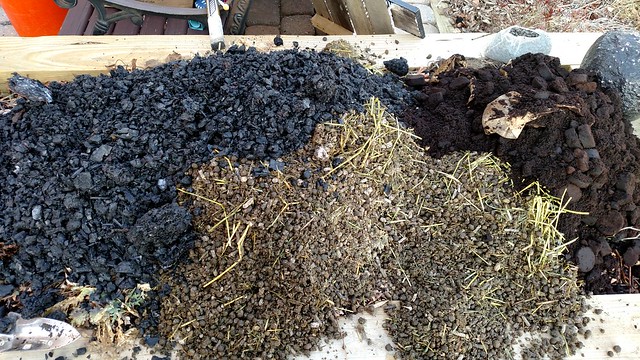
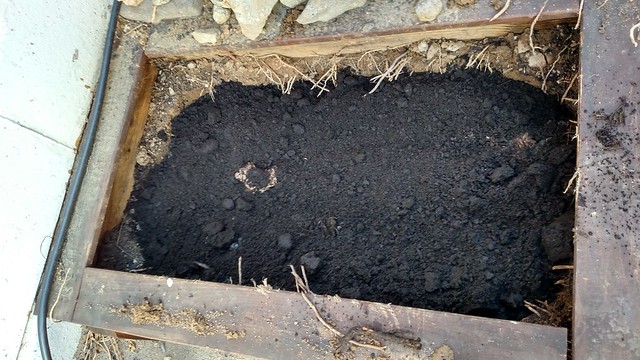
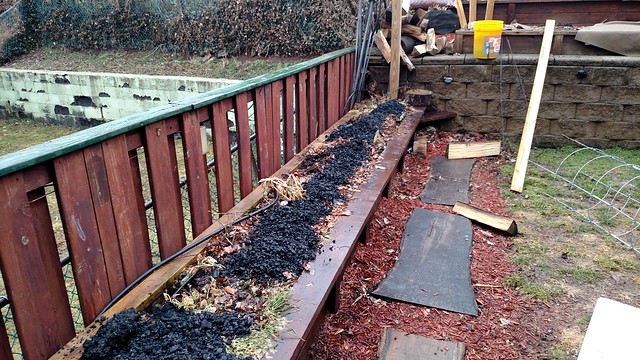
I'll be grinding some to a powder (best I can) and mixing with coffee grounds 50/50 to add to the beds in the late winter.
- Last month (this is actually UNcharged) sort of a test.

- January 2018 (all this was charged)


- Coarse char, coffee grounds, rabbit manure and bedding.

- Char and coffee grounds


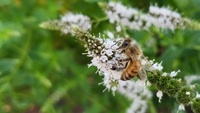
SQWIB- Posts : 366
Join date : 2016-03-07
Location : Philly 7A
 Re: Biochar?
Re: Biochar?
Have you had any problem of grasses growing from hay seeds left on the hay ?

plantoid-
 Posts : 4095
Posts : 4095
Join date : 2011-11-09
Age : 73
Location : At the west end of M4 in the UK
 Re: Biochar?
Re: Biochar?
plantoid wrote:Have you had any problem of grasses growing from hay seeds left on the hay ?
To be honest, I never noticed anything popping up, the only hay that goes in there is a bit of Timothy Hay, I believe its called.
And it's minimal.

SQWIB- Posts : 366
Join date : 2016-03-07
Location : Philly 7A
 Re: Biochar?
Re: Biochar?
SQWIB wrote:Just an update on the Bio-Char. Is it helping? Yes, I can't say for sure how it is helping but I can say for sure that it has increased the Soil Friability dramatically and earthworms are rampant throughout the beds so its not adversely affecting the earthworms, (based on observation, no control is set up)
Thanks for the update! It has been my experience that any time there is a lot of microbial activity, there will be a lot of earthworms, too. So, if Biochar increases the microbe activity, I could see the number of earthworms also increasing.
I recently dug a couple holes in my new raised beds to bury some kitchen scraps, and noticed there was not a single earthworm in the soil I dug out. These beds are filled to within 8" of the top with new wood chips, and the top 8" is filled with a mix of homemade compost, vermiculite, and coir. Apparently, not a single earthworm has made it through the chips into the soil - possibly because there is not enough incentive for them to go there. Next spring I will try to make enough Biochar that I can inoculate it and incorporate it into these beds. The large amount of compost in those beds should have added a lot of microbe activity.
"In short, the soil food web feeds everything you eat and helps keep your favorite planet from getting too hot. Be nice to it." ~ Diane Miessler, "Grow Your Soil"
 Re: Biochar?
Re: Biochar?
OhioGardener wrote:Thanks for the update! It has been my experience that any time there is a lot of microbial activity, there will be a lot of earthworms, too. So, if Biochar increases the microbe activity, I could see the number of earthworms also increasing.
I recently dug a couple holes in my new raised beds to bury some kitchen scraps, and noticed there was not a single earthworm in the soil I dug out. These beds are filled to within 8" of the top with new wood chips, and the top 8" is filled with a mix of homemade compost, vermiculite, and coir. Apparently, not a single earthworm has made it through the chips into the soil - possibly because there is not enough incentive for them to go there. Next spring I will try to make enough Biochar that I can inoculate it and incorporate it into these beds. The large amount of compost in those beds should have added a lot of microbe activity.
That's odd, maybe they're going deeper in the soil due to the weather? Maybe the wood chips are a barrier because they are newer woodchips? How thick is the layer of woodchips? Maybe it just needs another season.
I'll be digging in a post in one of my hugelkultur beds this weekend, I'll take note of the earthworm activity.

SQWIB- Posts : 366
Join date : 2016-03-07
Location : Philly 7A
 Re: Biochar?
Re: Biochar?
SQWIB wrote:I'll be digging in a post in one of my hugelkultur beds this weekend, I'll take note of the earthworm activity.That's odd, maybe they're going deeper in the soil due to the weather? Maybe the wood chips are a barrier because they are newer woodchips? How thick is the layer of woodchips? Maybe it just needs another season.
The wood chips are 10" to 12" thick, so it may be a combination of the thickness of them and the fact that they are new chips instead of aged/composted ones. I'll keep an eye on the new beds to see what happens. On all of the old, established raised beds I can see holes where worms come up to grab bits of compost to drag down into the soil. So, it may just be a matter of time before they start appearing in the new beds. They have Winter Rye growing on them, so the roots will drill down through the wood chips to open up channels for the worms.
"In short, the soil food web feeds everything you eat and helps keep your favorite planet from getting too hot. Be nice to it." ~ Diane Miessler, "Grow Your Soil"
 Re: Biochar?
Re: Biochar?
As a Certified Instructor, I have to mention that biochar is not needed for Square Foot Gardening. All plant life contains carbon, including the 1/3 fluffed peat moss and 1/3 compost used in making Mel's Mix.
Worms are especially attracted to the microbes that grow on coffee grounds.
Regarding worms migrating to the beds. New material does not have the microbe population that established beds have, so the ground worms have no to reason to migrate into them right away. I have found that "if you build a Bed with Mel's Mix, they will eventually come."
Little red wigglers eat microbes so burying little bundles of kitchen scraps will feed them. I prefer using worm tubes (3 or 4" PVC pipes with caps) for the scraps to keep them separate from the nutritious Mel's Mix. The LRW will move in and out of the tubes, and if you move the tube and put more rotten produce in it, they will find it.
Worms are especially attracted to the microbes that grow on coffee grounds.
Regarding worms migrating to the beds. New material does not have the microbe population that established beds have, so the ground worms have no to reason to migrate into them right away. I have found that "if you build a Bed with Mel's Mix, they will eventually come."
Little red wigglers eat microbes so burying little bundles of kitchen scraps will feed them. I prefer using worm tubes (3 or 4" PVC pipes with caps) for the scraps to keep them separate from the nutritious Mel's Mix. The LRW will move in and out of the tubes, and if you move the tube and put more rotten produce in it, they will find it.
Last edited by sanderson on 2018-11-06, 19:57; edited 1 time in total
 Re: Biochar?
Re: Biochar?
Found an interesting use for Biochar that I hadn't thought of before. Since we are now in the freezing weather time of the year, I put a small 2 gallon covered bucket in the mud room off the kitchen to collect the kitchen scraps (I don't call it waste), and then I empty it every day or two into the compost tumbler. A couple days ago, we cleaned the last of the green onions and put all of the scraps into that bucket, and in a very short time the smell of onions got very strong. I went into the garage and got some Biochar sprinkled it over the top of the scraps in the bucket and put the lid back on. Within a very short time, maybe a half hour, there was no more onion smell from that bucket. I am going to keep a small container of Biochar next to the kitchen scrap bucket and repeat the experiment as necessary. It is good to know the Biochar will go to the compost tumbler, and eventually into the raised beds. 
"In short, the soil food web feeds everything you eat and helps keep your favorite planet from getting too hot. Be nice to it." ~ Diane Miessler, "Grow Your Soil"
 Re: Biochar?
Re: Biochar?
OhioGardener wrote:Found an interesting use for Biochar that I hadn't thought of before. Since we are now in the freezing weather time of the year, I put a small 2 gallon covered bucket in the mud room off the kitchen to collect the kitchen scraps (I don't call it waste), and then I empty it every day or two into the compost tumbler. A couple days ago, we cleaned the last of the green onions and put all of the scraps into that bucket, and in a very short time the smell of onions got very strong. I went into the garage and got some Biochar sprinkled it over the top of the scraps in the bucket and put the lid back on. Within a very short time, maybe a half hour, there was no more onion smell from that bucket. I am going to keep a small container of Biochar next to the kitchen scrap bucket and repeat the experiment as necessary. It is good to know the Biochar will go to the compost tumbler, and eventually into the raised beds.
Awesome use of bio-char, It can also be used in water filtration

SQWIB- Posts : 366
Join date : 2016-03-07
Location : Philly 7A
 Re: Biochar?
Re: Biochar?
For those interested in the use of Bio-char, here are my observations. This is based on Bio-Char chunks not powder form.
There are many folks skeptical of the benefits of bio-char in an already fertile soil.
It may not add anything in the way of nutrients to the soil because it is mostly inert and may actually do more harm than good in a fertile soil if added uncharged.
Just bear in mind that using Perlite and Vermiculite are also inert amendments.
So let's set the nutrient benefit argument aside and look at it from a different angle.
I am no scientist and have researched this to death and had to ask myself the following questions
It does provide much more surface area for Microbial Activity, does this actually do any good in the garden? I dont know, so let's consider that a moot point and leave that for the scientists.
Is it wort it? From a cost perspective, absolutely and looking at Bio-char as purely a mechanical amendment, yes it is absolutely worth it for me.
What I mean by that is, even if it has "0" benefits storing and releasing nutrients, it still has some excellent mechanical qualities.
The following advantages I have personally seen in my garden as mechanical advantages are,
Other advantages for me.
As Sanderson pointed out Bio-char is not needed for Mels Mix and all plant life contains carbon, including the 1/3 fluffed peat moss and 1/3 compost used in making Mel's Mix.
However, vermiculite and perlite are not carbon based and Bio-char is.
I would love to see someone do some trials using it as a 4th addition in Mels mix and a separate trial replacing vermiculite/perlite altogether with Bio-Char.
If someone has Bio-char available and could utilize it as a free resource instead of purchasing perlite, that would be a plus.
If you come across Bio-char and are worried about dumping the char in your beds, at the least, add it to your compost bin.
Sanderson I'm not asking folks to change their ways or stray from Mels Mix, this is a SFG Site and I respect that, but I do like to think outside the box.
There are many folks skeptical of the benefits of bio-char in an already fertile soil.
It may not add anything in the way of nutrients to the soil because it is mostly inert and may actually do more harm than good in a fertile soil if added uncharged.
Just bear in mind that using Perlite and Vermiculite are also inert amendments.
So let's set the nutrient benefit argument aside and look at it from a different angle.
I am no scientist and have researched this to death and had to ask myself the following questions
- Is it doing any good in my soil?
- Will I keep using it?
- Is It worth it?
It does provide much more surface area for Microbial Activity, does this actually do any good in the garden? I dont know, so let's consider that a moot point and leave that for the scientists.
Is it wort it? From a cost perspective, absolutely and looking at Bio-char as purely a mechanical amendment, yes it is absolutely worth it for me.
What I mean by that is, even if it has "0" benefits storing and releasing nutrients, it still has some excellent mechanical qualities.
The following advantages I have personally seen in my garden as mechanical advantages are,
- Adds tilth, friability, fluff and aerates the soil at a fraction of the weight of other amendments, maybe not as lite as perlite.
- Has incredible water retention properties per weight.
- Reduces compaction even when walking on the beds.
Other advantages for me.
- It is free and readily available for me personally as it is a by-product.
- used it in place of perlite for my potted plants.
As Sanderson pointed out Bio-char is not needed for Mels Mix and all plant life contains carbon, including the 1/3 fluffed peat moss and 1/3 compost used in making Mel's Mix.
However, vermiculite and perlite are not carbon based and Bio-char is.
I would love to see someone do some trials using it as a 4th addition in Mels mix and a separate trial replacing vermiculite/perlite altogether with Bio-Char.
If someone has Bio-char available and could utilize it as a free resource instead of purchasing perlite, that would be a plus.
If you come across Bio-char and are worried about dumping the char in your beds, at the least, add it to your compost bin.
Sanderson I'm not asking folks to change their ways or stray from Mels Mix, this is a SFG Site and I respect that, but I do like to think outside the box.

SQWIB- Posts : 366
Join date : 2016-03-07
Location : Philly 7A
 Re: Biochar?
Re: Biochar?
SQWIB wrote:Is it wort it? From a cost perspective, absolutely and looking at Bio-char as purely a mechanical amendment, yes it is absolutely worth it for me.
What I mean by that is, even if it has "0" benefits storing and releasing nutrients, it still has some excellent mechanical qualities.

The eBook, Biochar - A Field Guide for Gardeners and Farmers, refers to Biochar as “Chicken Soup for the Soil”.
"Biochar brings fire’s benefit back to the garden, without fire’s disadvantages. Restoring fire’s by-products to soil will go a long way to restore natural quality to soil. Gardeners can do a lot to revive soil’s natural fertility by simply, properly adding appropriate biochar, Nature’s nano-‐technology.
Biochar is not a fertilizer. The bulk of it is not eaten by microorganisms. Biochar provides many services to soil. As a soil builder and stabilizer, biochar can increase productivity, and the gardener may save of manufactured NPK fertilizer."
Though the eBook refers to Biochar as "potentially substitute peat moss, vermiculite, perlite, or zeolite", I use it as an amendment and not a substitute. My reasoning is because I use such a small quantity of it compared to the amount of perlite or vermiculite. I know that Biochar is not included anywhere in the SFG mantra, but my my main concerns are the health of the plants and the nutrition level of the vegetables. My research has shown that Biochar addresses both of these issues, and for me Biochar is a free byproduct of clearing out brush and removing dead trees so why not use it?
"In short, the soil food web feeds everything you eat and helps keep your favorite planet from getting too hot. Be nice to it." ~ Diane Miessler, "Grow Your Soil"
 Re: Biochar?
Re: Biochar?
I am moving this paragraph by OhioGardener from another thread.
Next spring will be a new experiment for me - don't gardeners love to experiment?I am going to do a test with 3 raised beds by incorporating charged Biochar into the soil, and leave 2 raised beds without the Biochar. This will require turning over the soil in those 3 beds to mix in the Biochar, which will turn everything upside down and disturb much of the beneficial microbes & fungi. But, after that initial turning over to incorporate the Biochar, it will again return to no-till.
 Re: Biochar?
Re: Biochar?
This guy takes the biochar and lets it "compost" before using it:

Yardslave-
 Posts : 544
Posts : 544
Join date : 2012-01-19
Age : 73
Location : Carmel Valley, Ca.
 Re: Biochar?
Re: Biochar?
Yardslave wrote:This guy takes the biochar and lets it "compost" before using it:
I add some Biochar to my compost tumbler each time I start a new batch - it seems to speed up the composting process, and when I apply the compost to the gardens it adds the Biochar as well.
When I am going to use bulk Biochar, I charge it with compost tea to ensure it gets both the moisture and the microbes to inoculate it.
"In short, the soil food web feeds everything you eat and helps keep your favorite planet from getting too hot. Be nice to it." ~ Diane Miessler, "Grow Your Soil"
 Re: Biochar?
Re: Biochar?
I've been toying with the idea that instead of buying a bag of crushed char (at a premium price), I might just go to the local WallyMart and pick up a 20 pound bag of lump charcoal and crush it up- a lot cheaper than the small portion $30 char bags, but I'll have to crush it myself.

Yardslave-
 Posts : 544
Posts : 544
Join date : 2012-01-19
Age : 73
Location : Carmel Valley, Ca.
 Re: Biochar?
Re: Biochar?
Before trying too big of a bag, Yardslave, get a small bag and test it, and ensure it is natural chunks and not briquettes. Before I started making my own Biochar I bought an 8# bag of Cowboy Hardwood Lump Charcoal from the local Wallyworld to use. When I attempted to crush it, so that I could charge it, I found out that it could not be crushed - the chunks had not been heated enough to char the center of the chunks and it was still solid wood. The outside was charred, but not the inside. Probably every batch is different, though, depending on how long it was processed.
"In short, the soil food web feeds everything you eat and helps keep your favorite planet from getting too hot. Be nice to it." ~ Diane Miessler, "Grow Your Soil"
 Re: Biochar?
Re: Biochar?
S-
Yes there's a WallyMart about 12 mi. away in Salinas. Went over yesterday and bought a 20lb. of lump charcoal for just over $14. I have yet to open it, but it sounds like a sack of broken glass when I shake it, so I hope someone smashed the heck out of the charcoal lumps for me. If I have to break up the large chunks, I'll cover it with a piece of plywood and run over it with my car to "tenderize" it. I figure if I could squash my kid's trike backing out the driveway, the charcoal shouldn't be much of a problem
Yes there's a WallyMart about 12 mi. away in Salinas. Went over yesterday and bought a 20lb. of lump charcoal for just over $14. I have yet to open it, but it sounds like a sack of broken glass when I shake it, so I hope someone smashed the heck out of the charcoal lumps for me. If I have to break up the large chunks, I'll cover it with a piece of plywood and run over it with my car to "tenderize" it. I figure if I could squash my kid's trike backing out the driveway, the charcoal shouldn't be much of a problem

Yardslave-
 Posts : 544
Posts : 544
Join date : 2012-01-19
Age : 73
Location : Carmel Valley, Ca.
 Re: Biochar?
Re: Biochar?
I just wanted to thank everyone, sanderson, Ohiogardener, Yardslave, SQWIB and others for allowing me to revisit a concept that I thought might not be useful for my garden or climate but after further research I have decided to not only look at it further but perhaps a couple of experiments next year. I even just bought a Top Lit Uplift Gasifier Stove from Walmart and plan on making my own biochar as I get a ton of brush and branches from neighbors trees that line the property. The stove was pictured in the pdf on page 5 that I will post as a link to a University of Arizona Extension guide To Making and Using Biochar in Gardens in Southern Arizona. Previously had thought biochar would be great for sandy soils and that get an abundance of rainfall.
https://extension.arizona.edu/sites/extension.arizona.edu/files/pubs/az1752-2017.pdf
An article on charging biochar.
https://www.permaculture.co.uk/articles/how-charge-biochar
The article was basically echoing the video from Hawaii, mix biochar up to a 1:1 with compost, allow it to mature and ready to go.
I am liking biochar as a substitute as an ingredient in my mix leading to a greater degree of sustainability.
I hope I don't come off as a know it all as I have more questions than answers and constantly questioning methods and practices in a quest of good, better, best.
https://extension.arizona.edu/sites/extension.arizona.edu/files/pubs/az1752-2017.pdf
An article on charging biochar.
https://www.permaculture.co.uk/articles/how-charge-biochar
The article was basically echoing the video from Hawaii, mix biochar up to a 1:1 with compost, allow it to mature and ready to go.
I am liking biochar as a substitute as an ingredient in my mix leading to a greater degree of sustainability.
I hope I don't come off as a know it all as I have more questions than answers and constantly questioning methods and practices in a quest of good, better, best.

Dan in Ct-
 Posts : 295
Posts : 295
Join date : 2014-08-10
Location : Ct Zone 6A
 Re: Biochar?
Re: Biochar?
Dan in Ct wrote:I am liking biochar as a substitute as an ingredient in my mix leading to a greater degree of sustainability.
My only comment is to not use it as a substitute for other ingredients in your mix, but as an addition to it. My experiments have been with adding 5% to 10% Biochar to the top 6" of the raised beds - mixed in well. I mix the Biochar with an equal amount of compost and let it age, then spread it 1" thick over the bed and work it into the soil.
In next year's experiments, though, I am going to inoculate the Biochar with Compost Tea instead of the compost, which will allow it to be charged in minutes instead of days or weeks. That will mean I will only spread it 1/2" thick before working it into the soil.
"In short, the soil food web feeds everything you eat and helps keep your favorite planet from getting too hot. Be nice to it." ~ Diane Miessler, "Grow Your Soil"
 Re: Biochar?
Re: Biochar?
Dan, a few articles on Biochar you might find interesting:
Using Biochar in the Garden
Biochar Works in the Garden
What is Biochar
Using Biochar in the Garden
Biochar Works in the Garden
What is Biochar
"In short, the soil food web feeds everything you eat and helps keep your favorite planet from getting too hot. Be nice to it." ~ Diane Miessler, "Grow Your Soil"
 Re: Biochar?
Re: Biochar?
I have recently been adding it to my front gardens raw, not charged.
I just toss a bucket on top of the mulch and let it work itself in with rains and snow.
I just toss a bucket on top of the mulch and let it work itself in with rains and snow.

SQWIB- Posts : 366
Join date : 2016-03-07
Location : Philly 7A
 Re: Biochar?
Re: Biochar?
OG, thank you for the information. Although your first link takes me to Baker Creek, I do get about half my seeds from them in March at the Comstock Ferre site in Old Wethersfield, Ct basically across the river from me. Diagonally across the street from Comstock is Chas Hart Seed where I get my other half, this is the seed company that advertised on the back of comic books when I was a lad. You sold seeds for them to get prizes. A third seed company. New England Seed that has recently moved from Hartford to my side of the river, are now in East Hartford and I might check them out in March because I got my Neptune Harvest products from them in the past but I don't think they carry the line anymore but we do have a nursery in town that does with a higher price tag. I am out of the Seaweed Fertilizer that I use with new seedlings and when potting up.
If I can make a substantial amount of charged biochar and can use in the substitution of another ingredient to increase the sustainability of some of my mixes than I have to try. I am seeing research on biochar being used as a substitute for both perlite and sphagnum peat moss in greenhouse mixes. I am just looking at biochar abilities, I am not advocating this for anyone else. I do have raised beds but I started out growing in 5 gallon buckets and initially used the book as a reference for spacing for anything I hadn't grown before in a bucket. So I am basically a Bucketeer although rumor has it tomatoes do best in 7 gallons. I do most of my growing in the front yard and have had over 200 buckets going and growing. I do have to develop a mix for specifically to grow blueberries next year as I want to start adding perennial edibles.
I will be doing a considerable amount of research on biochar because when I first looked at it a few years ago, it had narrow temperature parameters in its manufacture. Charcoal was not biochar and now it is. A couple of links.
https://lib.dr.iastate.edu/cgi/viewcontent.cgi?article=4406&context=etd
These two links show it still takes time to make proper biochar.
https://www.growertalks.com/Article/?articleid=23562
https://ir.library.oregonstate.edu/concern/parent/9c67ws55g/file_sets/028711590
If I can make a substantial amount of charged biochar and can use in the substitution of another ingredient to increase the sustainability of some of my mixes than I have to try. I am seeing research on biochar being used as a substitute for both perlite and sphagnum peat moss in greenhouse mixes. I am just looking at biochar abilities, I am not advocating this for anyone else. I do have raised beds but I started out growing in 5 gallon buckets and initially used the book as a reference for spacing for anything I hadn't grown before in a bucket. So I am basically a Bucketeer although rumor has it tomatoes do best in 7 gallons. I do most of my growing in the front yard and have had over 200 buckets going and growing. I do have to develop a mix for specifically to grow blueberries next year as I want to start adding perennial edibles.
I will be doing a considerable amount of research on biochar because when I first looked at it a few years ago, it had narrow temperature parameters in its manufacture. Charcoal was not biochar and now it is. A couple of links.
https://lib.dr.iastate.edu/cgi/viewcontent.cgi?article=4406&context=etd
These two links show it still takes time to make proper biochar.
https://www.growertalks.com/Article/?articleid=23562
https://ir.library.oregonstate.edu/concern/parent/9c67ws55g/file_sets/028711590

Dan in Ct-
 Posts : 295
Posts : 295
Join date : 2014-08-10
Location : Ct Zone 6A
Page 3 of 5 •  1, 2, 3, 4, 5
1, 2, 3, 4, 5 
Page 3 of 5
Permissions in this forum:
You cannot reply to topics in this forum









